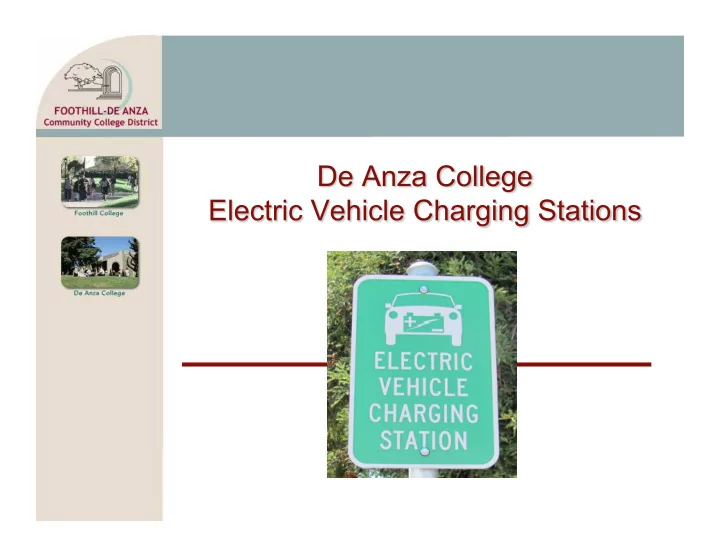

� Continues with District’s environmental sustainability commitment and leads by example. � Electric Vehicles are the future trend in transportation. The Charging stations encourage electric vehicle use. � National recognition of De Anza College via the National Charge Point System.
� Select method of payment via Pay Pal. � Use Mobile Application (Android & iOS), Credit Card, or RFID card (Radio Frequency Identification). � Connect electric vehicle via standard plug and begin fast charge 4-8 hours. � Manage and monitor charging of car via mobile application. � The mobile phone applications also can provide directions to the chargers and their availability. � Non-EV cars parked at charging stations will be cited by campus Police.
� Funding provided by De Anza College Measure C Photovoltaic Campus Wide project. � Lots A&B Photovoltaic project included the installation of 10 EV charging stations plus the infra- structure for future installation of 10 additional EV charging stations.
The charging stations consist of three primary components: Charging control display unit with revenue collection component. Retractable charging cord. Cellular connection to revenue collection.
� Electric vehicle stations will be ‘cost neutral’ to the District. � Staff, students and public will pay a flat rate of $0.55 per kWh for electric vehicle charge. � This fee includes; District paid utility costs, Pay Pal fee, GE fee, and District administration costs. � Costs will be reviewed periodically to ensure zero cost impact to the District. (Monthly, then quarterly)
� Parking will be limited to either permitted staff users, paid parking users, or designated visitors with current passes. � Pay structure can be assigned to several levels, as determined by the District. Current plan is to offer one fixed fee at an established rate, currently $0.55 per kWh. � Use by general public can be controlled, but is not currently planned. With paid parking, anyone can use them. � Time limits and expenses have been calculated as one use per day per charger. Additional use will either slightly decrease costs or slightly increase revenue.
� Estimated cost of added ‘future’ electric vehicle charging units is $6,300 each plus installation costs. Estimated at $10,000 each, depending on proximity to power source. � Infrastructure for 10 future electric vehicle charging stations is currently installed at De Anza College. � G.E. and Pay Pal contracts will support future growth of electric vehicle charging stations at De Anza, Foothill and other FHDACCD sites.
Recommend
More recommend